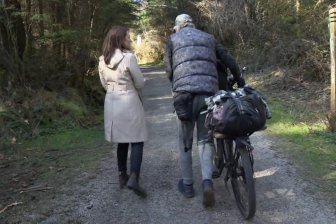When Christine Grice, a single mother, started looking for apartments to rent in Dundas, a community in Hamilton, Ont., in June, she said she was shocked by what she was seeing.

It isn’t just that a two-bedroom is now going for $1,795 in the very same building where Grice was renting a three-bedroom apartment for $1,650 only three years earlier.
It’s that rents seem to be climbing as Grice is searching.
“Their website says $1,399 (a month) but … when you get there it’s $1,499,” she says.
Grice says she has noticed quick rent increases both for large, professionally-managed properties and basement apartments advertised on Kijiji.
And available units are being snapped up at record speed, she says.
“You have to be fast,” she says, recalling how an apartment advertised for rent on a Friday already had applications the following day.
“I think it’s ridiculous that I can’t afford to live in the city I grew up in,” she says.
Rental bidding wars and cutthroat competition were routine fare in pricey markets like Toronto and Vancouver before the pandemic. But as government-imposed restrictions lift and activity revives in both the rental and property market, some of that big-city frenzy is coming to nearby smaller towns.
Hamilton has seen a 37-per cent year-over-year increase in rental transaction in June, says Mustafa Abbasi, president and chief revenue officer of online real estate marketplace Zolo.ca, citing data from the Real Estate Association of Hamilton and Burlington.
At the same time, average rent has climbed by a whopping 9 per cent year-over-year in July, from $2,200 to $2,400.
The numbers indicate a “substantial increase” in demand for rentals in the area, he says.
A similar phenomenon seems at play in Abbotsford, B.C., about an hour’s drive east of Vancouver, Abbasi notes.
There, rents rose by 15.8 per cent in June compared to the same period last year — one of the highest increases across Canada, according to Abbasi.
Those trends stand in marked contrast with what’s happening in Toronto and Vancouver, where the pandemic is putting downward pressure on rents.
The average rent for a vacant one-bedroom unit in Toronto is down more than 9 per cent compared to a year ago, while two-bedroom apartments are now 4.4 per cent cheaper, according to an analysis by rental listings site Rentals.ca.
In Vancouver, the average rent for a one-bedroom remained virtually flat, while the average vacant two-bedroom is now 6.7 per cent cheaper.

What’s driving up rents in smaller towns?
“Consumers are also looking at their working space: do they have enough space to work from home permanently?”
Workers who have been confined to typing from the couch of their bachelor apartment are craving more space. Parents who’ve been sharing the kitchen table with their children are longing for a home office.
At the same time, as employers get used to having employees work remotely, big-city dwellers probably feel they can relocate further afield from the office, Abbasi says.

And Rentals.ca says it saw unique pageviews for a number of southern Ontario communities spike between March and June this year. Innisfil — one hour and forty minutes north of Toronto — saw a 124-per cent increase in users’ interest. And Newmarket, London, St. Catharines and Niagara Falls all saw increases of more than 70 per cent.
While Torontonians are coming to Hamilton, Hamiltonians are moving to St. Catharines and Niagara Falls, Ferrante says.
For her part, Grice is still hoping to find an apartment in Hamilton she can afford on her $60,000 salary.
She wants to find a place where her 13-year-old twin daughters will be able to visit their friends without needing to hop in the car, she says.




Comments